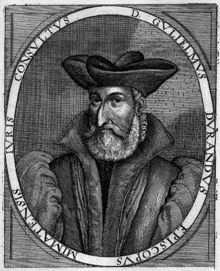- Guillaume Durand
-
For other people named Guillaume Durand, see Guillaume Durand (disambiguation).
Guillaume Durand, or William Durand, (c. 1230 – November 1, 1296), also known as Durandus, Duranti or Durantis, from the Italian form of Durandi filius, as he sometimes signed himself, was a French canonist and liturgical writer, and Bishop of Mende.
Contents
Life
He was born at Puimisson, near Béziers, of a noble family of Languedoc. He studied law at Bologna, with Bernardus of Parma, and by about 1264 was teaching Canon law with success at Modena. Pope Clement IV, another Frenchman, called him to the pontifical court as a chaplain and auditor of the palace, and in 1274 he accompanied Clement's successor, Pope Gregory X, to the Second Council of Lyons, the constitutions of which he helped draw up. As spiritual and temporal legate of the patrimony of St. Peter, he received in 1278, in the name of the pope, the homage of Bologna and of the other cities of Romagna. Pope Martin IV made him vicar spiritual in 1281, then governor of Romagna and of the March of Ancona (1283). In the midst of the struggles between Guelfs and Ghibellines, Durandus successfully defended the papal territories, both by diplomacy and by arms. Pope Honorius IV retained him in his offices, and although elected bishop of Mende in 1286, he remained in Italy until 1291. In 1295 he refused the archbishopric of Ravenna, offered him by Pope Boniface VIII, but accepted the task of pacifying his former provinces of Romagna and the March of Ancona. In 1296 he withdrew to Rome, where he died. His tomb is in the church of Santa Maria sopra Minerva.
Important Works
Durandus' principal work is the Speculum iudiciale, which was compiled in 1271, and revised in 1286 and 1291. It is a general explanation of civil, criminal and canonical procedure, and also includes a survey of the subject of contracts. It is a remarkable encyclopedical synthesis of Roman and ecclesiastical law, distinguished by its clarity, its method, and especially its practical sense, and its repute was as great and lasting in the courts as in the schools. It won Durandus the nickname of "The Speculator." It was commented upon by Giovanni Andrea (in 1346), and by Baldus. In 1306 Cardinal Béranger drew up an alphabetical table of its contents (Inventorium). There are many manuscripts of the Speculum, and several editions, of which the most usual is that of Turin in 1578 in 2 volumes, containing all additions -among them those by Giovanni d'Andrea and tables. This edition was reproduced at Frankfurt in 1612 and 1668.
Another important work by Durandus was the Rationale divinorum officiorum, a liturgical treatise written in Italy before 1286, on the origin and symbolic sense of the Christian ritual. It presents a picture of the liturgy of the 13th century in the West, studied in its various forms, its traditional sources, and its relation to the church buildings and furniture. With Martène's De antiquis Ecclesiae ritibus it is the main authority on the medieval Western liturgies. It has run through various editions since its first publication in 1459. The other important works of Durandus comprise:
- Repertorium iuris canonici (Breviarium aureum), a collection of citations from canonists on questions of controversy, often published along with the Speculum
- Commentarius in sacrosanctum Lugdunense concilium (ed. Fano, 1569), of especial value owing to the share of Durandus in the elaboration of the constitutions of this council (1274), and inserted by Boniface VIII in the Sextus.
His nephew, also called Guillaume Durand, was also a canonist. Guillaume Durand the Younger, a later bishop of Mende, was an advocate of ecclesiastical reform at the Council of Vienne.
References
On the elder Durand, see
- V. Leclerc in Histoire littéraire de la France, vol. xx. pp. 411-497 (1842)
- Schulte, Geschichte den Quellen des canonischen Rechts (1877)
- E. Mâle, L'Art religieux en XIIIe siècle en France (1898).
On the nephew, see
- Barthélemy Hauréau, in Journal des savants (1892), 64.
 This article incorporates text from a publication now in the public domain: Chisholm, Hugh, ed (1911). Encyclopædia Britannica (11th ed.). Cambridge University Press.
This article incorporates text from a publication now in the public domain: Chisholm, Hugh, ed (1911). Encyclopædia Britannica (11th ed.). Cambridge University Press.
Additional Reading
Thibodeau, Timothy M., trans. The Rationale Divinorum Officiorum of William Durand of Mende: A New Translation of the Prologue and Book One. New York: Columbia University Press, 2007. ISBN: 978-0-231-14180-2
Categories:- 1230 births
- 1296 deaths
- People from Hérault
- French theologians
- Canon law jurists
- 13th-century Roman Catholic bishops
- Bishops of Mende
Wikimedia Foundation. 2010.

